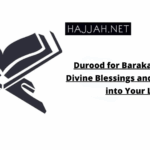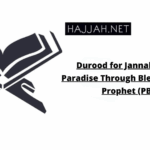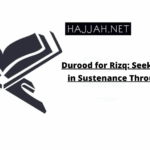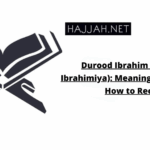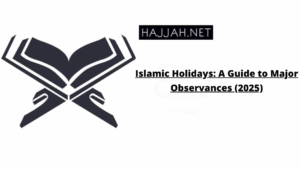In the journey of life, believers invariably face moments of vulnerability, fear, and exposure to various harms, both seen and unseen. Islam provides comprehensive guidance on seeking protection, primarily through direct supplication (Du’a) to Allah SWT (God), reliance on Him (Tawakkul), and specific acts of remembrance (Dhikr). Among the most beloved and powerful forms of Dhikr is the act of sending Durood (or Salawat) – peace and blessings upon Prophet Muhammad (peace and blessings be upon him).
While not always framed as a direct “talisman,” the consistent and sincere recitation of Durood is understood within Islamic tradition to be a profound means of attracting Allah’s mercy, blessings, and consequently, His divine protection. This article explores how this cherished act of devotion can serve as a spiritual shield for a Muslim.
The Foundation: Why Durood is a Source of Blessings and Protection
The practice of sending Salawat upon Prophet Muhammad (PBUH) is deeply rooted in Islamic teachings and carries immense virtue:
Also Read
- A Divine Command & Angelic Practice: Allah SWT Himself commands the believers in the Holy Quran:
“Indeed, Allah confers blessing upon the Prophet, and His angels [ask Him to do so]. O you who have believed, ask [Allah to confer] blessing upon him and ask [Allah to grant him] peace.” (Quran 33:56 – Surah Al-Ahzab) By fulfilling this command, believers align themselves with the practice of Allah and His angels, drawing divine favor.
- Receiving Allah’s Blessings Tenfold: A cornerstone of Salawat’s virtue is the promise of multiplied blessings from Allah. The Prophet Muhammad (PBUH) said: “Whoever sends blessings upon me once, Allah will send blessings upon him ten times.” (Sahih Muslim) These divine blessings encompass mercy, forgiveness, and elevation in rank, all of which contribute to a state of spiritual well-being and protection.
- An Act Beloved by Allah: Engaging in acts that are beloved by Allah naturally draws His special care and attention towards the servant. Sending Salawat upon His final Messenger (PBUH) is undoubtedly such an act.
This foundation of divine favor and multiplied blessings creates an overarching spiritual environment conducive to protection.
How Durood Specifically Contributes to Protection
While Allah is the ultimate Protector, the act of reciting Durood can be a means through which His protection is sought and manifested:
-
Warding Off Shaytan (Satan): Shaytan is a primary source of misguidance, anxiety, and evil whispers. Any form of sincere Dhikr (remembrance of Allah), including Salawat which is a high form of Dhikr, strengthens the heart against Shaytan’s influences. A heart occupied with the remembrance of Allah and His Prophet (PBUH) is less susceptible to satanic instigations. While Ayat al-Kursi and the Mu’awwidhatayn (Surahs Al-Falaq and An-Nas) are specifically known for direct protection from Shaytan, consistent Durood contributes to overall spiritual fortification.
-
Alleviation of Worries and Calamities: The famous Hadith of Ubayy ibn Ka’b (may Allah be pleased with him) illustrates the power of Salawat in relieving distress. When Ubayy considered dedicating all his supplication time to sending Salawat upon the Prophet (PBUH), the Prophet (PBUH) told him: “Then your worries will be taken care of, and your sins will be forgiven.” (Tirmidhi – Graded Hasan). Being “taken care of” in one’s worries is a significant form of protection from the pain and burden of anxieties, hardships, and potential calamities. This implies that through the Barakah (blessings) of Salawat, Allah may ease one’s difficulties or provide the strength and means to overcome them.
-
A Means for the Acceptance of Du’a (Including Du’as for Protection): It is a well-established etiquette in Islam to begin and conclude personal supplications (Du’as) with praise for Allah and Salawat upon Prophet Muhammad (PBUH). Scholars emphasize that a Du’a framed by Salawat is more likely to be accepted by Allah. Therefore, when a believer specifically makes Du’a for protection from any harm – be it physical danger, evil eye, envy, or oppression – including abundant Salawat significantly increases the hope of that plea being answered.
-
Inviting Divine Assistance and Support: Engaging consistently in acts beloved by Allah, such as sending plentiful Salawat, draws a servant closer to their Lord. This nearness invites Allah’s special care, guidance, and divine assistance (Tawfiq) in all affairs, which naturally includes safeguarding from harm and misguidance.
-
Overall Spiritual Shield and Barakah: The encompassing Barakah (divine blessings, increase in good) that descends upon an individual who frequently recites Durood acts as a general spiritual shield. This can manifest as protection from unseen harms, deflection of minor misfortunes, or an increase in overall well-being that makes one less vulnerable to various negativities.
Specific Duroods and General Recitation for Protection
While certain specific (often longer) Duroods or supplications including Salawat are sometimes traditionally associated with particular protective benefits, the core principle lies in the sincere and frequent act of sending Salawat itself.
- Durood Ibrahim: The form recited in Salah (the formal prayer) is considered the most complete and excellent.
- Simple Forms: Even simple forms like “Allahumma salli ‘ala Muhammad” (O Allah, send blessings upon Muhammad) or “Sallallahu ‘alayhi wa sallam” (May Allah’s peace and blessings be upon him) recited abundantly carry immense virtue.
The emphasis is on the consistency and sincerity of the act rather than solely on a particular lengthy formula, unless that formula itself is directly from an authentic Hadith for a specific purpose.
Integrating Durood for Protection into Daily Life
To seek Allah’s protection through the means of Durood:
- Recite Frequently: Make it a habit to send Salawat numerous times throughout the day and night.
- Morning and Evening Adhkar: Include Salawat in your regular morning and evening remembrances.
- Before Sleep: Combine it with other protective recitations like Ayat al-Kursi and the last three Surahs of the Quran.
- When Feeling Fearful or Facing Danger: Turn to Salawat alongside other Du’as for safety.
- After Obligatory Prayers: A highly recommended time.
- Whenever the Prophet’s (PBUH) Name is Mentioned: Immediately send Salawat.
The Holistic Approach to Protection in Islam
Seeking protection in Islam involves a comprehensive approach where Durood plays a supportive role alongside:
- Direct Du’a to Allah for Protection: Using specific supplications for safety from harm.
- Tawakkul (Absolute Trust in Allah): Believing that ultimate protection comes only from Him.
- Taking Permissible Physical Precautions: Islam encourages taking reasonable worldly measures for safety.
- Recitation of Specific Quranic Verses/Surahs: Such as Ayat al-Kursi, Surah Al-Falaq, and Surah An-Nas.
- Giving Sadaqah (Charity): It is believed that charity can ward off calamity.
- Maintaining Righteous Deeds and Avoiding Sin: Living a life in obedience to Allah naturally invites His protection.
Conclusion
Sending Durood (Salawat) upon Prophet Muhammad (peace and blessings be upon him) is a profoundly virtuous act, deeply beloved by Allah, and a source of immense blessings for the believer. While Allah is the sole Protector, the regular and sincere recitation of Durood serves as a powerful spiritual means to seek His divine safeguarding. It works by attracting Allah’s mercy and blessings, increasing the likelihood of specific Du’as for protection being accepted, alleviating worries that encompass many forms of harm, and creating an overall spiritual fortitude that can repel evil influences by His Will. Incorporating abundant Salawat into one’s life is thus a beautiful and effective way to seek comprehensive well-being and divine protection in this world and the Hereafter.


